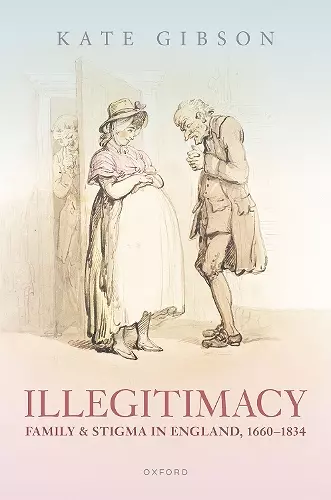Illegitimacy, Family, and Stigma in England, 1660-1834
Format:Hardback
Publisher:Oxford University Press
Published:4th Aug '22
Should be back in stock very soon

Illegitimacy, Family, and Stigma is the first full-length exploration of what it was like to be illegitimate in eighteenth-century England, a period of 'sexual revolution', unprecedented increase in illegitimate births, and intense debate over children's rights to state support. Using the words of illegitimate individuals and their families preserved in letters, diaries, poor relief, and court documents, this study reveals the impact of illegitimacy across the life cycle. How did illegitimacy affect children's early years, and their relationships with parents, siblings, and wider family as they grew up? Did illegitimacy limit education, occupation, or marriage chances? What were individuals' experiences of shame and stigma, and how did being illegitimate affect their sense of identity? Historian Kate Gibson investigates the circumstances that governed families' responses, from love and pragmatic acceptance, to secrecy and exclusion. In a major reframing of assumptions that illegitimacy was experienced only among the poor, this volume tells the stories of individuals from across the socio-economic scale, including children of royalty, physicians and lawyers, servants and agricultural labourers. It demonstrates that the stigma of illegitimacy operated along a spectrum, varying according to the type of parental relationship, the child's race, gender, and socio-economic status. Financial resources and the class-based ideals of parenthood or family life had a significant impact on how families reacted to illegitimacy. Class became more important over the eighteenth century, under the influence of Enlightenment ideals of tolerance, sensibility, and redemption. The child of sin was now recast as a pitiable object of charity, but this applied only to those who could fit narrow parameters of genteel tragedy. This vivid investigation of the meaning of illegitimacy gets to the heart of powerful inequalities in families, communities, and the state.
The book offers a great starting point for further studies to expand on the gendered and racialised experiences of illegitimacy, especially within the context of mobility, migration and displacement. * Eliska Bujokova, Family and Community History vol. 26 /3 *
This is a beautifully produced book and one which provides a rigorous and nuanced picture of the complex lived experience of illegitimate individuals in the long eighteenth centu * Samantha Williams, Culture and Social History *
ambitious...innovative... a beautifully produced book and one which provides a rigorous and nuanced picture of the complex lived experience of illegitimate individuals in the long eighteenth century. * Samantha Williams, Cultural and Social History *
fascinating insights...an impressive feat... essential reading for anybody interested in the history of the family, gender, and the social, cultural, and legal contexts of eighteenth-century England. * Sarah Fox, Women's History Review *
Approaches the subject in entirely new ways... a sophisticated and meticulous analysis of what it meant to be illegitimate in late Stuart and Georgian England, which will undoubtedly become a core text in the field. * Angela Muir, Local Population Studies *
- Winner of Shortlisted, 2023 RHS Whitfield Prize, Royal Historical Society.
ISBN: 9780192867247
Dimensions: 240mm x 161mm x 23mm
Weight: 608g
314 pages